What Rosemary Tea Is Good For and How to Brew
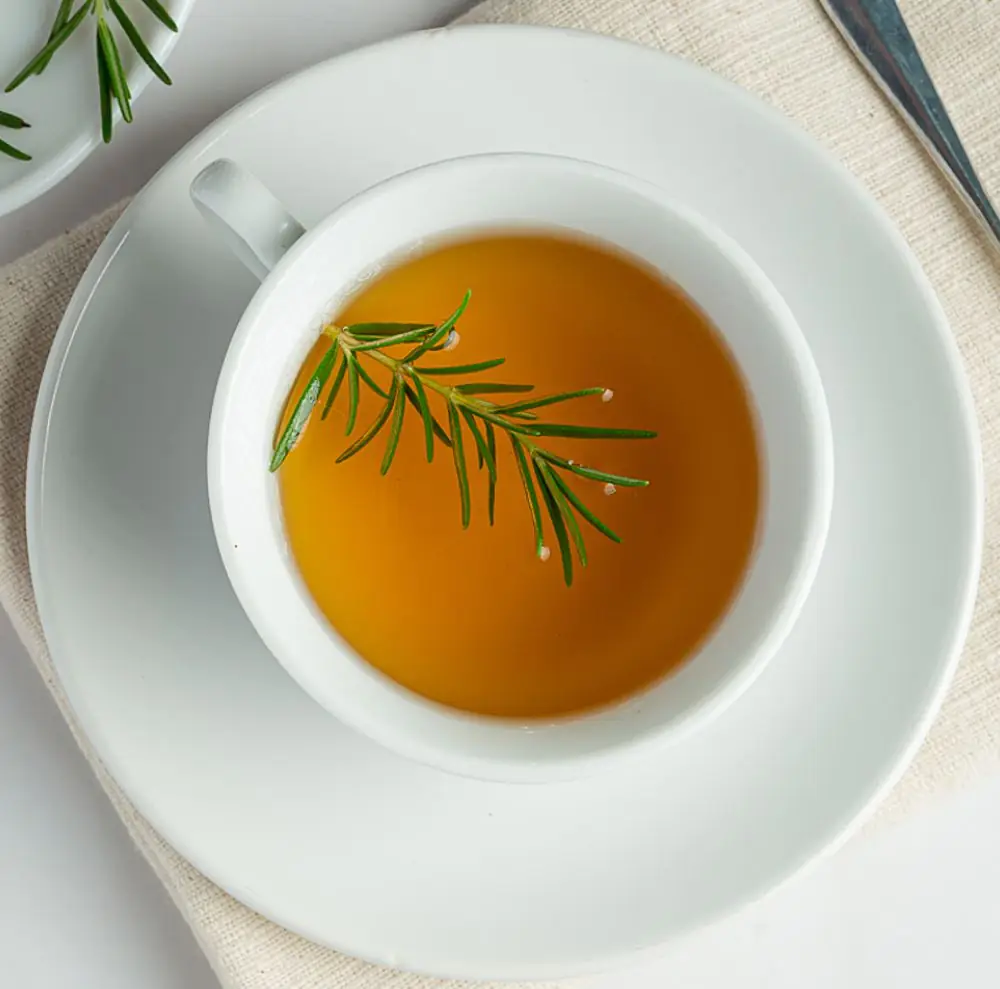
Fragrant and beautiful, rosemary is a shrub that everyone likes. What rosemary tea is good for, and how do you brew the tea? Are the health benefits of it that we see in the media real? Is it safe for pregnant women? Does it improve memory and make digestion more effective?
Read on to find the answers to all these and numerous other questions about drinking this tea.
What Is Rosemary?

This wonderful aromatic shrub that comes from the Mediterranean area has been known to humanity for many thousands of years. The beautiful multi-colored flowers of the plant are loved for their fragrance, while the dried rosemary leaves can be brewed for herbal tea or used to flavor exquisite foods. Essential oil of the herb is also popular in traditional medicine because of its potential health benefits.
For a long time, rosemary has been used to treat nervous disorders, headaches, high blood pressure, skin inflammation, and other illnesses. You’ve probably already heard that this tea may help to promote hair growth, activate blood circulation, and lower blood sugar.
Let’s take a closer look at how the aromatic medicinal herb improves each system and overall health.
What Does Rosemary Tea Do for You: Antioxidants

Compounds in rosemary tea known as antioxidants neutralize chemically active free radicals: antioxidants protect your cells and tissues from damage, prevent systemic inflammation, and slow down aging.
As well as rosemary oil, rosemary tea is very rich in two potent antioxidants called rosmarinic acid and carnosic acid. Numerous studies demonstrate that these acids can slow the growth of cancer cells, including prostate cancer and leukemia.
What’s more, rosmarinic acid and other bioactive compounds found in this plant also have antibacterial effects. Traditional medicine used the leaves of the shrub to help wound healing.
In fact, the antioxidant properties of dried and fresh rosemary are so potent that in some countries, it is used as a natural substitute for artificial food and beverage preservatives. It is marked as E392 on food labels.
What’s Known About the Benefits of Rosemary Tea: Blood Sugar Lowering
Test-tube and animal studies of the plant extract demonstrate that rosemary can increase the rate at which the body absorbs glucose into muscle cells, which leads to a decrease in blood sugar. While the concentration of bioactive compounds in extracts is much higher than in teas, if you suffer from type 2 diabetes or were diagnosed with pre-diabetes, you might benefit from enjoying a cup or two of rosemary tea every day.
Is Rosemary Tea Good for Memory and Sleep?
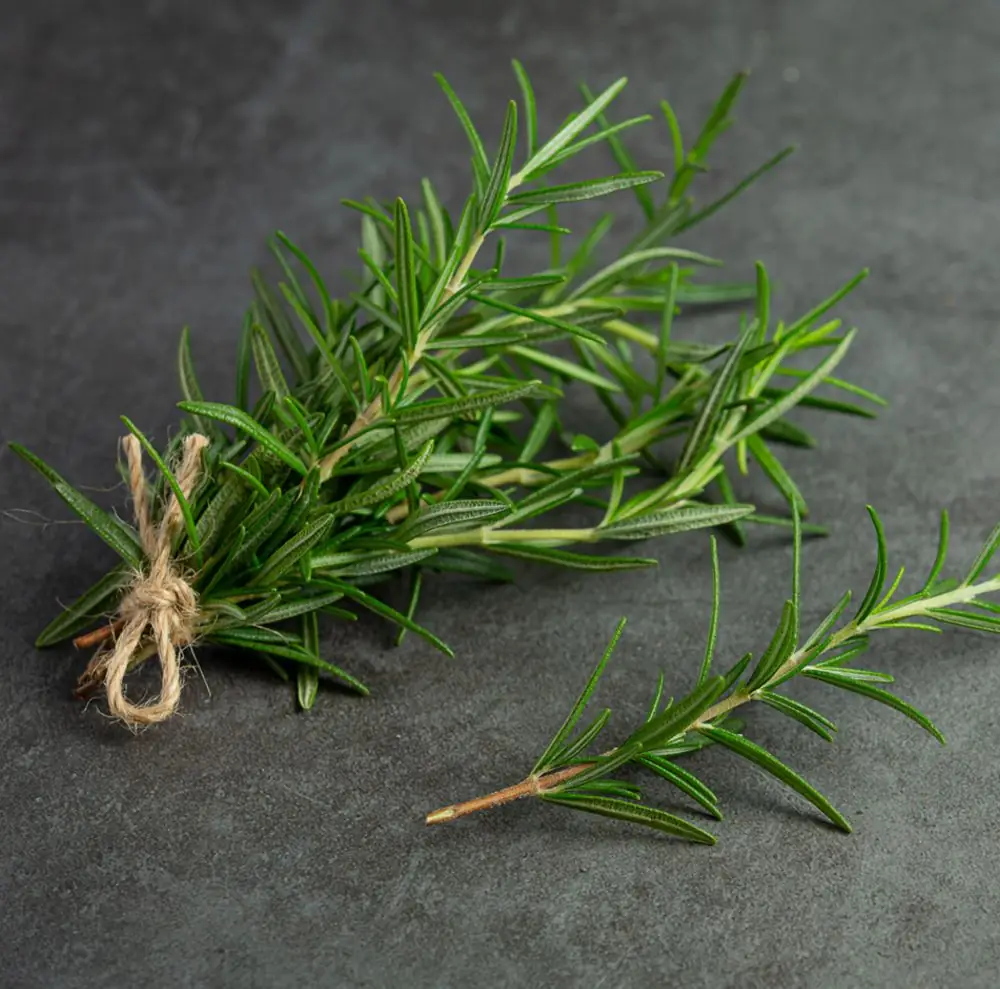
While additional research is still required, preliminary studies effectively demonstrate that regular drinking of this beverage is good for both your mood and memory. For instance, a 2017 study found that giving college students oral rosemary twice a day for a month dramatically reduced anxiety levels and enhanced memory and sleep quality. Another small-scale study conducted in 2015 found that those participants who consumed rosemary daily felt considerably less tired at the end of their working day than those who consumed nothing.
What’s more, inhaling rosemary aroma or oil alone can improve mental performance and concentration as well as stimulate brain activity.
Last but not least, the rosemary leaf extract may be able to cure and prevent dementia, according to a 2013 study. Another 2012 study suggested that rosemary may help older adults with cognitive function. A more recent 2016 review concludes that rosemary can also be used for improving the symptoms of Alzheimer’s disease.
Is Rosemary Tea Good for Arthritis?
Natural antioxidants found in rosemary — namely rosmarinic and carnosic acids — can reduce systemic inflammation, which is known to be one of the causes of arthritis. Still, this beverage should not be used as your sole remedy for this condition: consult with an experienced health practitioner to have therapy that works in your case.
Is Rosemary Tea Good for Headaches?
While there is not enough scientific data to claim that drinking rosemary tea can relieve a headache, there are studies that demonstrate that rosemary prevents the death of cells in the brain and supports recovery from such conditions as stroke. If you suffer from persistent headaches, you need to seek professional medical help; rosemary tea can help you in addition to the therapy prescribed by your doctor.
Does Rosemary Tea Help with Hair Growth?
Probably, you shared a widespread belief that this beverage stimulates hair growth because of vital nutrients to hair follicles. However, there is not enough scientific evidence to back up these claims. Recent studies, however, suggest that you need to apply rosemary oil or extract of the plant directly to the scalp to achieve a reduction in hair loss, although the actual efficacy of this remedy is still not reliably known.
Is It True That Rosemary Tea Has Benefits for the Eyes?
While this tea is extremely unlikely to make your vision sharper, there is ongoing research into the effects of this plant on age-related eye diseases. In a 2013 study on rats, a combination of rosemary extract and zinc oxide was found to prevent age-related retinal eye damage, while another 2012 study on rodents demonstrated that carnosic acid (a compound found in rosemary) protects eyes from oxidative stress. These results were later confirmed in more recent studies.
There are two important caveats to these findings, though. First, research on humans is lacking, and second, the concentrations of rosemary in the extracts are much higher than in teas. For these reasons, it is difficult to say what the actual effects of rosemary tea might be and how much you would need to consume to experience the advantages mentioned above.
Is Rosemary Tea Good for Constipation?
While there is little evidence that this beverage can be used to treat acute cases of constipation or indigestion (except for hydrating your body), there are several studies that demonstrate that rosemary promotes a healthy balance of microflora and good bacteria, so it reduces inflammation in the intestine. For these reasons, if you suffer from constipation, you might want to regularly enjoy rosemary tea to address your problem in the long term.
What’s more, foods like beans, peas, raspberries, chia seeds, avocados, prunes, and raw artichokes are very high in dietary fiber that feeds good bacteria in your gut and stimulates your intestines by making your stool heavier and bulkier. Add all these foods to your daily diet to enjoy regular bowel movements.
Is Rosemary Tea Good for the Liver and Weight Loss?
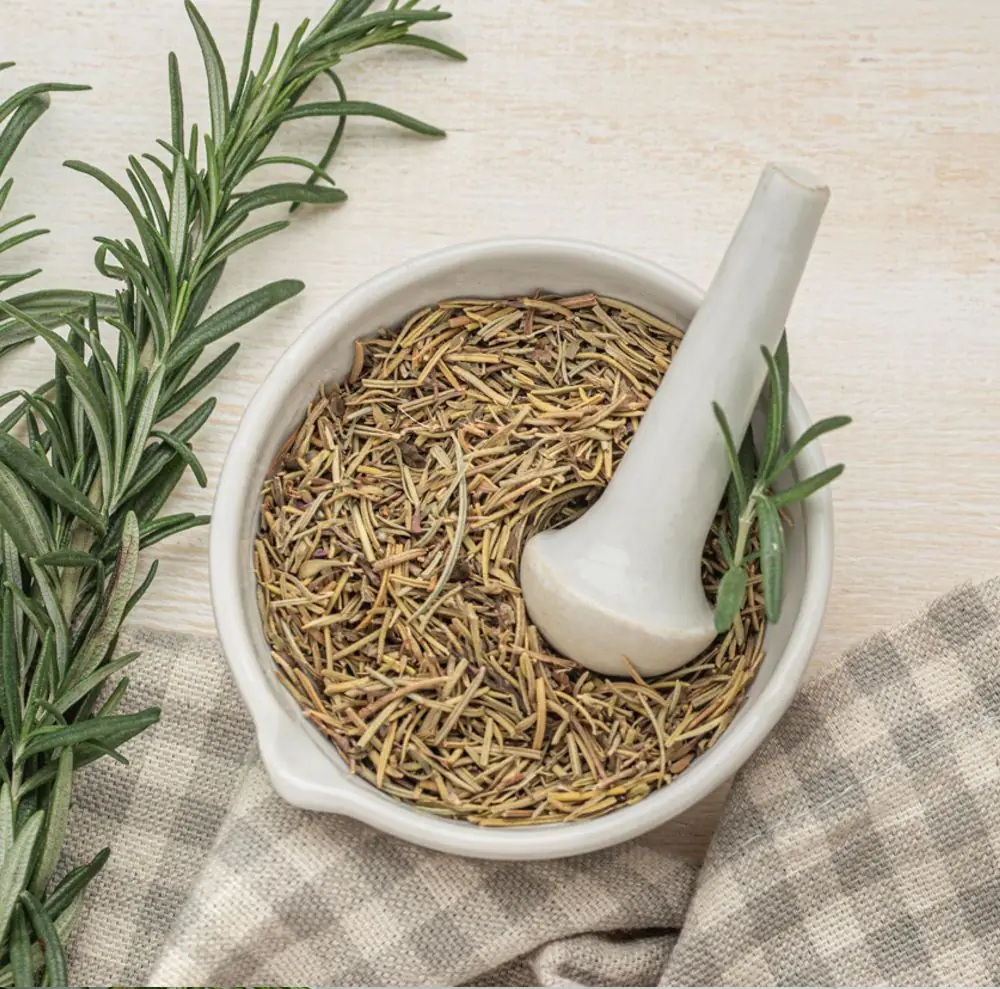
Although additional research is needed, a 2010 study on rodents came to an optimistic conclusion that consuming rosemary leaf extract can prevent obesity and weight gain as well as protect against obesity-related liver steatosis. While including rosemary tea in your daily diet does not automatically mean that you can eat food that is high in fats and refined carbohydrates without gaining pounds if you want to lose weight, rosemary tea and supplements can be of some help.
Is Rosemary Tea Good for Kidneys?
This beverage can indirectly help your kidneys by lowering your blood sugar levels.
Still, if you suffer from a major kidney condition, consult with an experienced doctor to find out how many cups of rosemary tea you are allowed to drink per day.
Is Rosemary Tea Good for Pregnancy?
The answer is no, if you are pregnant, you should avoid drinking rosemary tea and using extracts of this herb.
There is a widespread belief in traditional medicine that high amounts of rosemary can lead to a miscarriage. Modern medicine lacks information about the safety of this plant during pregnancy: to be on the safe side, it is recommended that pregnant women avoid including rosemary in their diet.
Does Rosemary Tea Offer Benefits for Menstruation?
Traditional medicine uses this plant to stimulate menstrual flow. However, the safety of this remedy is not known: if your menstrual cycles are not regular or you have other health issues related to menstruation, it is recommended that you consult with an experienced gynecologist rather than use rosemary.
It should be also noted that rosemary is not a good source of iron as sometimes is claimed on the Internet. To replenish iron reserves, which are often depleted because of profuse menstruation, you need to eat enough meat, eggs, and fish with fresh vegetable salads. It is also important to note that citric and ascorbic acids that are abundant in lemons and other citrus fruits can significantly improve iron absorption from plants.
When Should I Avoid Drinking Rosemary Tea?

No matter how impressive the health benefits of rosemary tea are, it would be best if you were careful with any medicinal herb. In addition to being potentially unsafe for pregnant and breastfeeding women, this beverage is also known to interact with such medications as:
- Anticoagulant (blood-thinning) drugs: Aspirin, Warfarin, Clopidogrel
- Medications for blood pressure known as ACE inhibitors: Captopril, Elaropril, Lisinopril, Fosinopril
- Diuretics (pills that stimulate urination): Lasix, Hydrochlorothiazide
- Lithium (used for treating mental health disorders)
- Medications for diabetes.
If you drink this beverage in combination with the above-described medications potential side effects of rosemary tea can outweigh its benefits. If you suffer from the above-described conditions or take any of the medications mentioned above, consult an experienced health practitioner to determine whether rosemary is safe for you.
It also needs to be said that some people are allergic to the rosemary plant. If you suffer from an allergy to Aspirin or Salicylates, this plant might be unsafe for you. Stop using rosemary tea if you experience allergic symptoms like an itchy throat, runny nose, or difficulty breathing.
How to Use Rosemary in Tea
To make rosemary tea, you will only need two ingredients: clean drinking water and high-quality rosemary leaf, like this one:
Whole Rosemary Leaf by Frontier Co-op
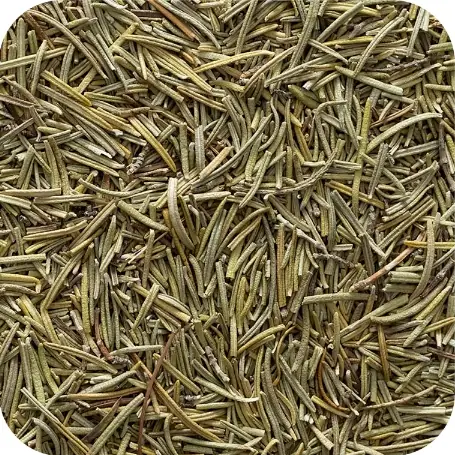
- 453 grams (16 oz)
- USDA-certified organic
- Non-GMO
- Nothing but pure, whole rosemary leaves
Tea is a great way to have a little rest during the day. Here is what you should do to brew rosemary tea:
- Boil 300 milliliters (about 10 ounces) of water.
- Add loose rosemary leaves (1 teaspoon) to the boiling water.
- Steep your tea for 5 (or 10 if you prefer a more robust flavor) minutes.
- Strain the leaves from the water and discard them.
- If you prefer sweet teas, use your favorite sweetener (non-caloric stevia will be a good choice).
- Now it’s time to enjoy your tea!
If you are always on the go and don’t have enough time to make tea at home or would like to reap the 10 benefits of the higher concentrations of bioactive compounds in rosemary, you might prefer to buy and use this extract:
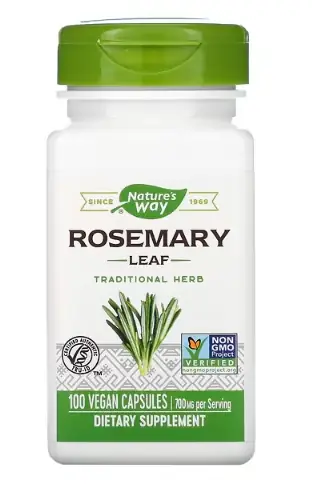
- 50 servings (700 mg each) per container
- Non-GMO and vegan
- No artificial colors and flavors
What Is the Amount of Rosemary Tea I Can Safely Drink?
It is believed that if you drink one or two cups of rosemary herbal tea per day, you are unlikely to experience any serious side effects. An abundance of antioxidants in rosemary tea makes it an ideal choice for using every day. What’s more, if you like to drink your beverages sweet, it is recommended that you use stevia (zero calories) instead of sugar (abundant in empty calories).
Now you know what rosemary tea is good for. While this beverage has numerous benefits for the body, no plant, however, is a cure-all: if you are suffering from a severe medical condition, seek professional help from an experienced health practitioner.